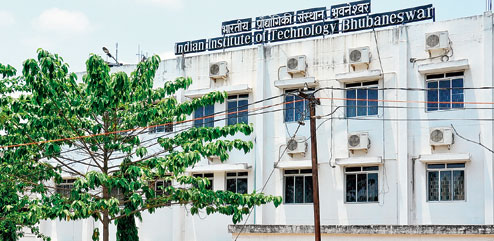 |
| IIT Bhubaneswar |
New Delhi, Sept. 7: The Indian Institutes of Technology are preparing to spearhead a unified campaign for academic independence of universities across the country to counter higher education regulator UGC’s directives on the design and duration of courses and entry qualifications.
Several directors of the premier tech schools said they plan to argue in the IIT Council that such academic matters should be decided by individual institutions.
The directors said that when the council meets on September 22, they would tell human resource development minister Smriti Irani that the University Grants Commission’s role should be limited to deciding names of degrees.
The IIT Council, which is headed by the HRD minister and includes the directors and chairpersons of all the IITs, the UGC chairperson and three MPs, is the apex body to decide on matters related to the tech schools.
IIT Guwahati director Gautam Biswas said all courses offered by the technological institutes had been prepared by experts, keeping in mind the emerging needs of society and international practices of higher education.
“We will argue that all the courses of IITs must be protected.”
The IIT Council, headed by the HRD minister, is the apex body to decide on matters related to the tech schools.
The decision to fight for academic autonomy follows recent instances of the UGC pressuring institutions, including IITs, to cancel four-year undergraduate programmes in the general science stream and prescribing norms challenging the legitimacy of many programmes the tech schools offer.
The UGC’s notification on specification of degrees, published in the Gazette of India in July 2014, has been sent to over 700 universities and institutions that grant degrees, including the IITs.
In the notification, the UGC — which had earlier forced Delhi University to scrap its four-year undergraduate programme in June — asked the institutions to follow its specified nomenclature of degrees and duration of courses and the eligibility criteria for admissions. The IITs offer programmes like the four-year BS (Bachelor of Science), BTech/MTech dual degree of five-year duration, and BS/MS (Bachelor of Science and Master of Science) dual degree, also of five-year duration. The UGC list of specified degrees has 129 types of programmes but does not include certain programmes the IITs offer, such as the four-year BS. The notification also mentions master’s degree as the admission criterion for enrolling in a PhD programme. This invalidates nearly 20 per cent of PhD students in IITs who were given admission because of their outstanding BTech scores. The IIT Council had earlier approved this model to attract the best talents and stop them from joining private firms.
“The UGC notification says the entry qualification for PhD is MTech or master’s. What will happen to the 20 per cent of our PhD students who were admitted on the basis of their BTech scores?” said Dheeraj Sanghi, dean of academic affairs at IIT Kanpur.
Professor P.M. Bhargava, a former director of the Centre for Cellular and Molecular Biology, said the UGC’s prescriptions of homogenous degrees, duration of programmes and entry qualifications went against innovation and pursuit of excellence.
“Nowhere in the world does the regulator or the government prescribe the duration and entry qualification for any programme. Top institutions, whether it is Harvard, Cambridge or Oxford University, decide their own courses.”
Bhargava said students who show the potential for research “must get entry” to PhD after BTech, and added that making a master’s degree the minimum qualification for joining a PhD programme was unprofessional.
“It will affect excellence and innovation,” he said.
UGC chairman Ved Prakash said the regulator had gone by the UGC Act, which says the commission has the exclusive right over specification of degrees. “The matter will be discussed at the IIT Council,” he said. “But we have gone by the law.”










